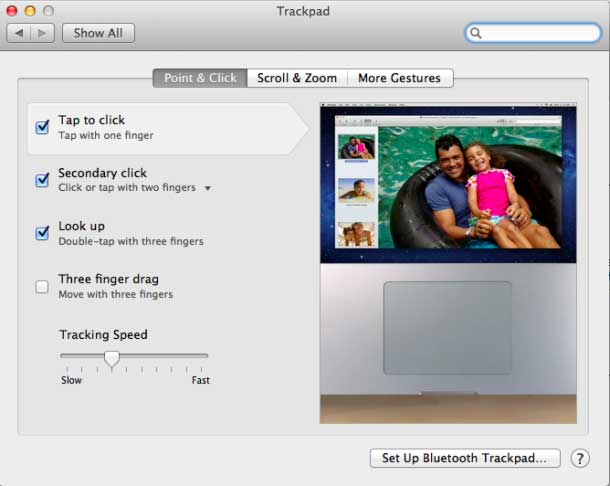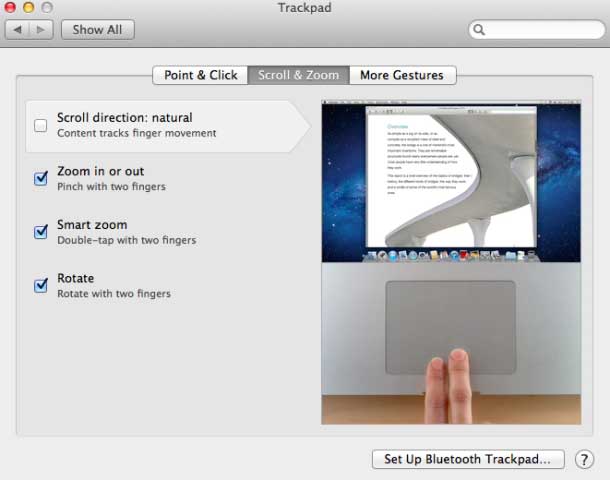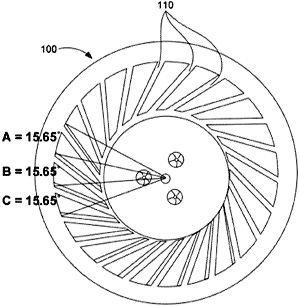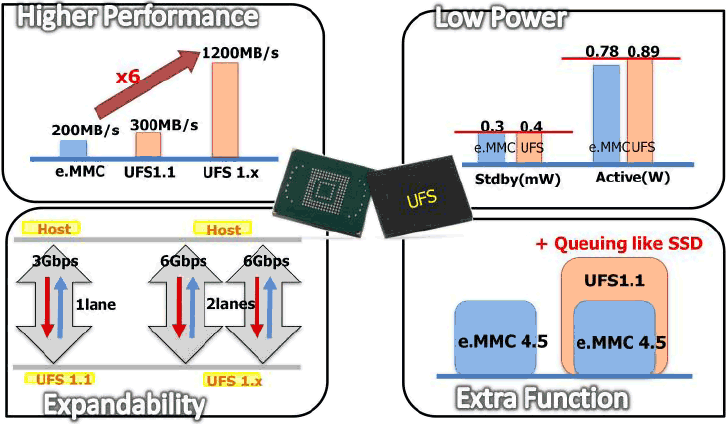News & Opinion
Tech Trends
General Apple and Mac desktop news is covered in Mac News Review. iPad, iPod, iPhone, and
Apple TV news is covered in iOS News
Review. Older Macs are covered in Vintage Mac News. All prices are in US
dollars unless otherwise noted.
Purchases made through links to Amazon.com and
Apple's iTunes/iBook/App/Mac App Store support Low End Mac.
News & Opinion
Tips and Tweaks for New MacBook Users
Cnet's Dan Ackerman comments that as much as new MacBook owners love
to rave about their systems, no laptop - even one with an Apple logo -
comes right out of the box ready to perform optimally. Ackerman
suggests several tweaks, tips, and fixes you should check out on day
one that will make your MacBook easier to use. Included are:
- Turn on tap-to-click - one of my first steps setting up any new
laptop

Turn on Tap to Click in Trackpad System Preferences.
- Reverse "natural" scrolling - I actually haven't done this since
installing OS X 10.8 Mountain
Lion on my MacBook. I find myself familiar enough with the reversed
scrolling direction from using my iPad that it's not an issue for me on
the Mac. What I wish could be fixed are the maddeningly anorexic scroll
bars and lack of scroll arrows in Lion and Mountain Lion!

Turn off Natural Scrolling in Trackpad System Preferences
- Get a new web browser - A no-brainer. Safari 6 is a better than
decent Web browser, and I use it, but I typically have at least three
Web browsers up and running, with Firefox, Chrome, Maxthon, and Opera being current favorites.
- Comparison shop for apps - I've never warmed to the App Store
concept. For example, I much preferred using physical media for
installing OS software in particular, but also in general I think
vendor independence for third-party application software was a better
system. I second Ackerman's advice to shop around for better prices on
third-party stuff.
- Use Image Capture instead of iPhoto - Personally, I don't use
iPhoto, and prefer Photoshop Elements or just the Finder for photo
management. As Ackerman observes, Apple's iPhoto has its virtues, but
is bloated, can be slow at times, and stores images by default in a
hard-to-find library. I haven't tried using the Image Capture app, but
I think I'll check out Ackerman's suggestion to use it as an
alternative.
Link: First Day Tips
and Tweaks for New MacBook Owners
When You Should (and Shouldn't) Buy AppleCare
Gizmodo's Kyle Wagner notes that if you're buying an Apple product,
whether it's a new machine or Certified Refurbished, adding a few
hundred dollars more to the upfront price for AppleCare extended
warranty coverage can hurt - and you already get a year of AppleCare
included in the price of the device.
Do you need to pay for the longer coverage? Wagner says it depends
substantially on what device you're buying. Short answer: If you're
buying an expensive professional machine, especially one that will be
used away from an office or home workstation like a MacBook Pro with
Retina Display, going with AppleCare is probably a no-brainer.
An option unique to iPhones called AppleCare+ also merits serious
consideration. For optional $100 extra, Apple will cover two incidents
of accidental damage with a $50 deductible apiece, which could pay off
big time if, say, you drop your iPhone in a swamp (like your editor's
daughter recently did hers).
On the other hand, for lower-priced Apple products, AppleCare
coverage can represent a sizable percentage of the overall purchase
cost, and especially if you upgrade to new systems frequently, the odds
of benefiting from an extended warranty are not high.
Also note that you don't have to make up your mind at the time of
purchase. You can upgrade to the extra two years of warranty coverage
any time during the first year of ownership.
Link: When You Should
(and Shouldn't) Buy AppleCare
Patent Filings Detail Retina MacBook Pro's Quiet
Asymmetric Fans
 AppleInsider's
Mikey Campbell reports that a trio of patent applications discovered on
Thursday reveal how the asymmetric fan blade spacing used in the newest
MacBook Pro with Retina display models quiet the spinning impeller
without sacrificing performance.
AppleInsider's
Mikey Campbell reports that a trio of patent applications discovered on
Thursday reveal how the asymmetric fan blade spacing used in the newest
MacBook Pro with Retina display models quiet the spinning impeller
without sacrificing performance.
The three patent applications, all titled "Centrifugal blower with
asymmetric blade spacing" and numbered sequentially by the US Patent
and Trademark Office cover separate fan designs that feature
asymmetrically aligned fan blades, two with 31 blades and one with 61
blades.
Link: Patent Filings
Detail Retina MacBook Pro's Quiet Asymmetric Fans
Tech Trends
Windows 8 Reduces Sales of Windows PCs
Wall Street Cheat Sheet's Emily Knapp notes that Microsoft and its
loyal fans had high hopes for Windows 8, but research firm NPD's latest
estimate indicates that sales of Windows PCs are actually lower now
than they were a year ago, with US resellers moving 13% fewer Windows
devices from late October, when Windows 8 debuted, through the first
week in December, than in the same period last year.
Knapp cites Pacific Crest Securities analyst Brendan Barnicle
predicting to the New York Times that tablets are doing to the laptop
market what laptops did to the desktop market, and that laptop PC sales
will continue to erode to a point where the PC market will only be a
fraction of what it once was, and she notes that another problem for
Microsoft is that Windows 8 for tablets, despite its strong
touchscreen orientation, has not been as well-received as new Apple
products usually are.
Link: Is Windows 8
D.O.A.?
If Ultrabooks Go Bust, Cache SSDs Could Fall by the
Wayside
IHS iSuppli's Ryan Chien says that the immense popularity of tablet
devices, as well as other rising or recent technologies on the horizon,
could significantly cut into the overall prospects of flash memory in
cache solid state drives (SSD) now used for superthin Ultrabooks and
similarly built PCs, according to an IHS iSuppli Memory on the Move
market brief from information and analytics provider IHS.
Chien reports that shipments of a type of low-power memory known as
Embedded
Multimedia Card (eMMC)* used in tablets are set to rise to 160
million units in 2016, up from 45 million units this year. In
comparison, shipments of cache SSDs used in Ultrabooks are projected to
grow from 15 million to 145 million units during the same five-year
period based on current Ultrabook forecast assumptions that in every
year during the forecast, tablet eMMC memory will outflank cache SSD
prospects.
Working alongside a physical hard disk, cache SSDs - so-called
because the flash memory is used as a cache - help to boost speed and
performance in Ultrabooks and other PCs. The new hybrid Fusion Drives
optionally available with Apple's latest iMacs and Mac minis are an
example.
The report says that overall, media tablets remain the biggest
threat to Ultrabooks a year after the Intel Corp. launched its
superthin PC laptop specification, and that forecasts for consumer SSDs
rely on Intel's fast-storage specification, which will eventually push
cache SSD beyond just mainstream Ultrabooks and expanded its use to PCs
as a whole.
However, Chien notes that the concurrent presence in the marketplace
of tablets - whose status as a coveted item among consumers has only
continued to grow with time - has altered the landscape for Ultrabooks,
and, by extension, cache SSDs. Without Intel's strict standards
specifying cache SSD as a necessary part of storage for computers
wishing to join the Ultrabook bandwagon, PC manufacturers can leverage
the optimizations of newer operating systems around hard drive storage.
Such a development could then end up pushing flash memory, especially
cache SSD, down the priority list for PC manufacturers focused on
lowering bill-of-materials costs.
Another looming obstacle to cache SSD is Universal Flash
Storage (UFS),* a faster-acting successor to eMMC, tailored
specifically for mobile applications and computing systems requiring
low power and high performance. UFS is expected to make its appearance
in the next 18 months, and its energy efficiency is superior to already
efficient Ball Grid Array (BGA) and mSATA - mini serial advanced
technology attachment - SSDs.

A third competitor to cache SSDs in Ultrabooks is Google's
Chromebook, such as those made by Samsung Electronics, a category of
machine that supports only limited onboard software capabilities and
relies heavily on the Internet to perform its tasks. Chien notes that
recent ChromeBook retooling includes eMMC and a dual-core ARM Cortex
A15 processor to help lower costs, allowing the Chromebook to be
offered with an attractive $250 price tag that can't be matched by the
much more expensive Ultrabooks, which cost close to a thousand dollars
for basic models, or even more for units with expanded specs. And
because the laptops are able to tap into the resources of the cloud,
the lack of physical storage on ChromeBooks becomes a less intractable
obstacle.
Chien thinks Ultrabooks still have a good fighting chance in their
bruising scuffle with tablets, especially if manufacturers find a way
to lower pricing and consumers become excited, particularly as the
just-launched Windows 8 software also finds traction among users. He
contends that the appealing hardware form factor of a superthin mobile
computing device, coupled with a newly minted operating software
system, should ignite the market and revive prospects for the PC - and
along with it, cache SSDs.
But he concedes that ultimately, failure of the Intel Ultrabook
standard would be a painful setback to the budding cache SSD ecosystem.
Higher average selling prices and higher-density SSDs might help make
up for the big drop in cache SSD shipments, but the consumer SSD market
overall will still shrink dramatically if Ultrabooks don't take off,
leaving the nascent cache SSD environment acutely compromised as a
result.
Link: Implications for
Flash if Ultrabooks Go Bust
Bargain 'Books
For deals on current and discontinued 'Books, see our 13" MacBook and MacBook Pro,
MacBook Air, 13" MacBook Pro, 15" MacBook Pro, 17" MacBook Pro, 12" PowerBook G4, 15" PowerBook G4, 17" PowerBook G4, titanium PowerBook G4,
iBook G4, PowerBook G3, and iBook G3 deals.
We also track iPad,
iPhone, iPod touch, iPod classic, iPod nano, and iPod shuffle deals.



 AppleInsider's
Mikey Campbell reports that a trio of patent applications discovered on
Thursday reveal how the asymmetric fan blade spacing used in the newest
MacBook Pro with Retina display models quiet the spinning impeller
without sacrificing performance.
AppleInsider's
Mikey Campbell reports that a trio of patent applications discovered on
Thursday reveal how the asymmetric fan blade spacing used in the newest
MacBook Pro with Retina display models quiet the spinning impeller
without sacrificing performance.

